Managing multiple currencies involves understanding exchange rates, choosing the right cards, and avoiding unnecessary fees. Keep an eye on live rates, use currency exchange apps, and select cards with low or no foreign transaction fees. Carry a small amount of cash for emergencies and rely on digital payments where possible. Planning your currency and withdrawal strategy helps you save money and stay protected. For more practical tips on managing your money abroad, explore the details ahead.
Key Takeaways
- Use multi-currency accounts and digital tools to monitor real-time exchange rates and time currency exchanges strategically.
- Choose payment methods with low or no foreign transaction fees and ensure card compatibility for international use.
- Carry small amounts of local currency for emergencies, while primarily relying on secure digital payments.
- Research local currency denominations and banking facilities to optimize cash handling and reduce exchange costs.
- Stay compliant with local laws, secure digital wallets, and be aware of foreign exchange regulations and reporting requirements.
Understanding Exchange Rates and Currency Conversion
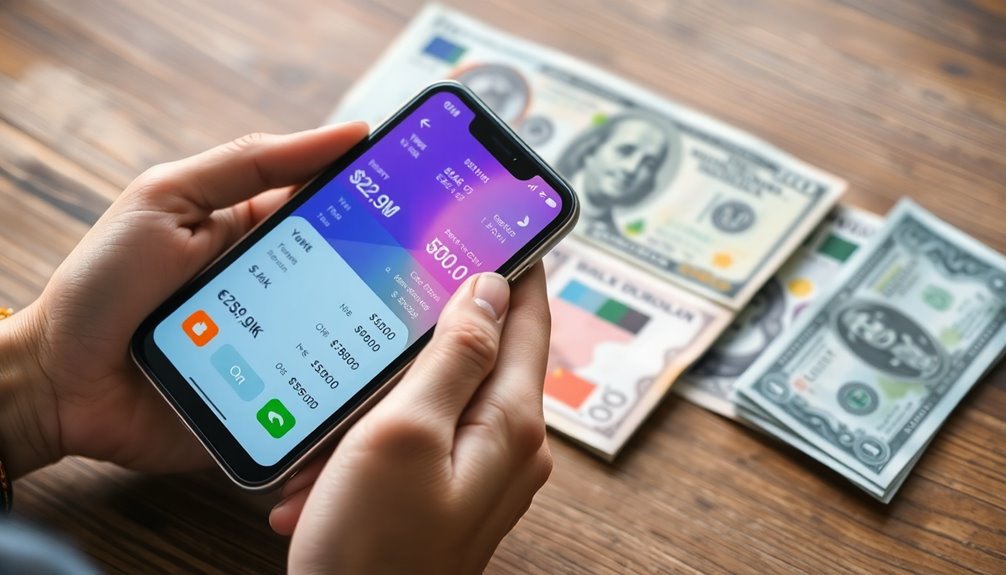
Have you ever wondered how currencies are exchanged and what determines their value? When you deal with international transactions, you’re working with dynamic exchange rates that constantly change based on market conditions. These fluctuations, known as currency fluctuation, happen due to factors like economic data, political stability, and global events. Because exchange rates are always shifting, the amount you receive when converting currencies can vary day to day. Understanding this helps you plan better, whether you’re transferring money or making purchases abroad. Keep in mind that currency conversion isn’t just about the rate itself—it also involves fees and charges that can add up, affecting how much you actually spend or receive. Staying informed about exchange rate trends helps you manage your money more effectively abroad. Knowing about different types of exchange rates can also help you make smarter currency conversion decisions. Being aware of market volatility enables you to anticipate potential changes in currency values and adjust your plans accordingly. Additionally, understanding currency exchange platforms can help you find the most favorable rates for your transactions. Moreover, keeping an eye on economic indicators can provide insights into future currency movements, allowing for more strategic financial planning. Familiarizing yourself with the factors influencing currency value can further enhance your ability to navigate international finance effectively.
Choosing the Right Debit and Credit Cards for International Use
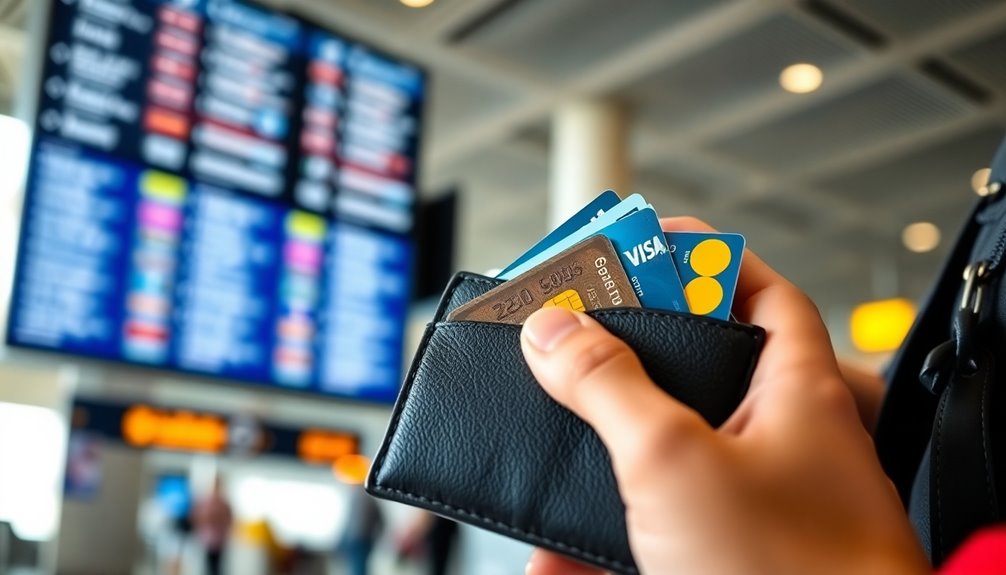
When traveling internationally, choosing the right debit and credit cards can save you money and avoid hassles. To make the best choice, consider these factors:
- Card network compatibility – Ensure your card works globally (Visa, Mastercard, or American Express) to avoid acceptance issues. Many reputable options are vetted to ensure reliability and security, which is especially important abroad. Additionally, confirm that your card supports international transactions to prevent unexpected declines or fees.
- Foreign transaction fees – Select cards with low or no foreign transaction fees to save on costs.
- Credit score impact – Some cards can help improve your credit score with responsible use, so pick those that report to credit bureaus.
- Rewards and benefits – Look for cards offering travel perks, cashback, or points suited for international travel.
- Understanding Vetted – It’s important to choose reputable cards that are vetted for reliability and security, especially when used abroad. Additionally, consider the security features of your chosen cards to protect against fraud during your travels.
Avoiding Foreign Transaction Fees
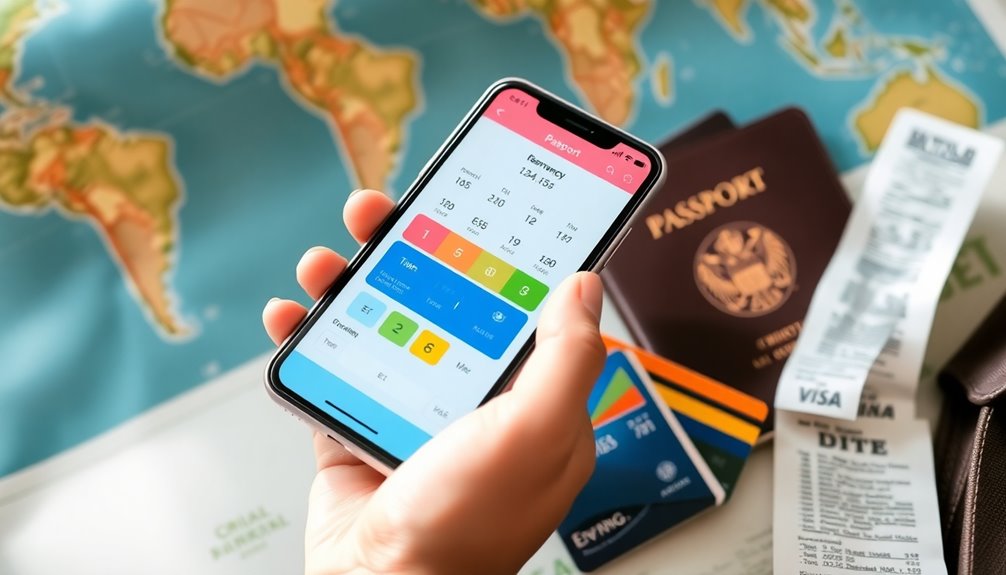
To avoid foreign transaction fees, you should consider currency conversion strategies that save you money. Using fee-free cards can also help you steer clear of extra charges when making international purchases. Understanding these options lets you manage your expenses more effectively abroad. Additionally, being aware of dilution guidelines and the safety measures for currency exchanges can help prevent unnecessary costs and risks. Checking the trustworthiness of your currency exchange provider can also ensure your funds are secure during transactions. Being informed about well-being tips related to financial health can further support your peace of mind when traveling. For example, selecting reputable currency exchange services can significantly reduce the risk of scams and unfavorable rates. Knowing about electric bikes and their features can also be useful if you plan to rent or purchase one during your trip, ensuring you choose a model suited to your needs.
Currency Conversion Strategies
Avoiding foreign transaction fees starts with choosing the right payment methods. To maximize currency conversion, consider strategies like understanding dynamic pricing, which can fluctuate based on market conditions, and currency hedging, which protects you from unfavorable exchange rate movements. Here are four tips to help you save:
- Use local currency payments whenever possible to avoid extra conversion fees.
- Monitor exchange rates to identify optimal times for currency exchange.
- Leverage financial tools that offer real-time rate alerts.
- Consider multi-currency accounts to lock in favorable rates and reduce reliance on dynamic pricing fluctuations.
- Incorporate mindful merchant service risk management strategies to keep track of your expenses and prevent unnecessary conversions, ensuring your transactions stay aligned with your overall home decor financial planning, and stay informed about Pimple Patch options for skincare routines. Additionally, understanding exchange rate volatility and how it impacts your transactions can further enhance your currency management approach.
Using Fee-Free Cards
Using fee-free credit or debit cards is one of the most effective ways to sidestep foreign transaction fees. These fee-free cards don’t charge extra when you make purchases abroad, helping you save money on currency exchange fees. Before traveling, research and select cards that specifically advertise no foreign transaction fees, ensuring you won’t be surprised by hidden costs. Keep in mind that some cards may have partnership networks or ATM fee reimbursements, further reducing expenses. When paying, always choose card payments over cash, as this often results in better exchange rates. Being aware of catering delivery trends can help you understand the best times and places to use your cards for maximum savings. Additionally, understanding currency conversion processes can help you anticipate exchange rates and avoid unfavorable transactions. By relying on fee-free cards, you simplify managing multiple currencies and avoid unnecessary charges, making your international transactions more budget-friendly and hassle-free.
Utilizing Currency Exchange Apps and Tools
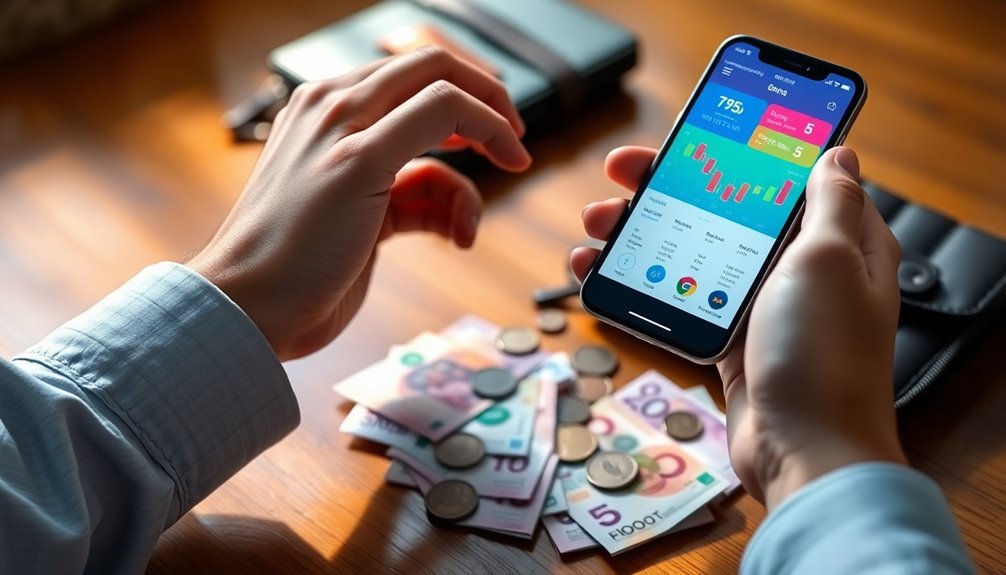
In today’s digital world, currency exchange apps and tools make managing multiple currencies much simpler. They help you track real-time rates, avoid unnecessary fees, and stay organized. Here are four ways to make the most of these tools:
Managing multiple currencies is easier with digital tools that track rates, reduce fees, and keep you organized.
- Use currency converter apps to check live exchange rates before making transactions. Real-time rate tracking can help you identify the best times to exchange currency. Staying informed about nutrient retention in raw foods can also influence your dietary choices while abroad.
- Link your cryptocurrency wallets for quick conversions and transfers between digital and fiat currencies.
- Open foreign currency accounts to hold and manage funds in different currencies, reducing conversion costs.
- Utilize apps that offer rate alerts, so you can exchange money when rates are favorable. Additionally, understanding performance upgrades available for various Honda models can help you optimize your vehicle’s capabilities while traveling.
- Being aware of expiration of vape juice and other perishable items can help you avoid waste during international travels. Additionally, understanding paint sprayer maintenance can ensure your equipment stays in top condition for ongoing projects.
Managing Cash and Digital Payments Safely
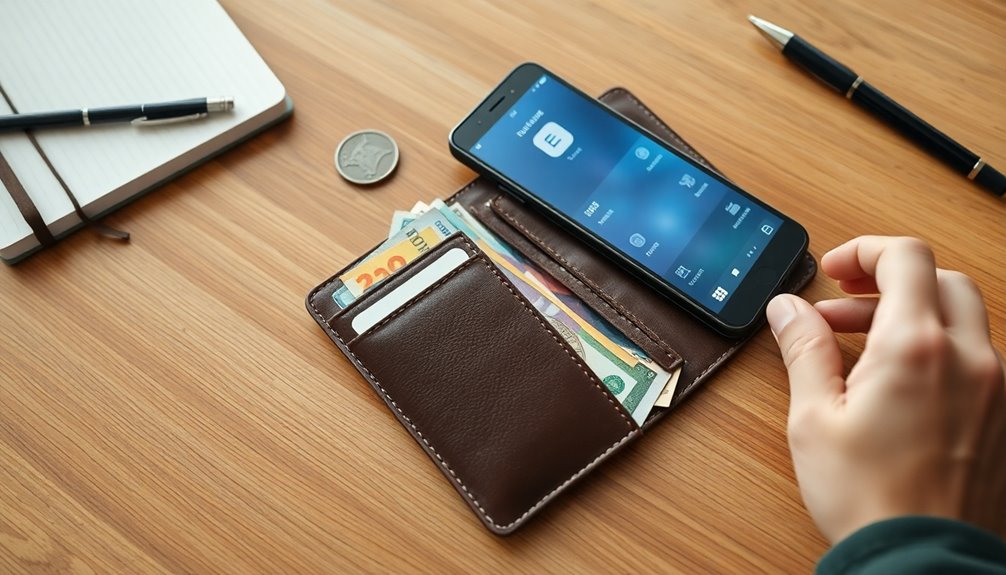
To keep your cash and digital payments secure, you need to use trusted payment methods and stay vigilant against fraud. Always follow currency exchange tips to avoid unnecessary fees and unfavorable rates. Protect your digital wallets with strong passwords and enable two-factor authentication to prevent unauthorized access. Being aware of potential security vulnerabilities can further safeguard your financial information.
Secure Payment Methods
Have you ever wondered how to guarantee your cash and digital payments stay secure in today’s fast-paced financial environment? Protecting your funds is essential, especially with rising threats like cybersecurity breaches. Here are four ways to enhance your online payment protection:
- Use strong, unique passwords for all accounts, especially those linked to cryptocurrency security.
- Enable two-factor authentication on your banking and payment apps.
- Regularly update your software and security settings to patch vulnerabilities.
- Avoid sharing sensitive information and only use trusted platforms for online transactions. Incorporating privacy policies can help you understand data protection practices and make informed decisions.
Currency Exchange Tips
When exchanging currencies, taking steps to protect your cash and digital payments helps prevent costly errors and fraud. Always use reputable currency exchange services or withdraw cash from secure ATMs to avoid scams. Be aware of foreign exchange regulations that may restrict certain transactions or require reporting large amounts. If you’re involved in cryptocurrency investments, ensure you’re complying with local laws to avoid penalties. Keep digital payments secure by avoiding public Wi-Fi and enabling two-factor authentication. Carry a small amount of local currency for emergencies, but rely on digital payments where possible for added security. Remember, understanding the rules around foreign exchange and managing your digital assets carefully helps you avoid pitfalls and ensures a smoother financial experience abroad.
Protect Digital Wallets
Protecting your digital wallet is essential for safe digital payments and preventing theft or fraud. To guarantee strong digital wallet security, follow these key steps:
- Use strong, unique passwords and enable two-factor authentication to prevent unauthorized access.
- Keep your device’s software and apps updated to benefit from the latest encryption practices.
- Avoid public Wi-Fi when accessing your digital wallet; use a trusted VPN for added security.
- Regularly monitor your transactions for suspicious activity and report any irregularities immediately.
Keeping Track of Multiple Currencies and Expenses
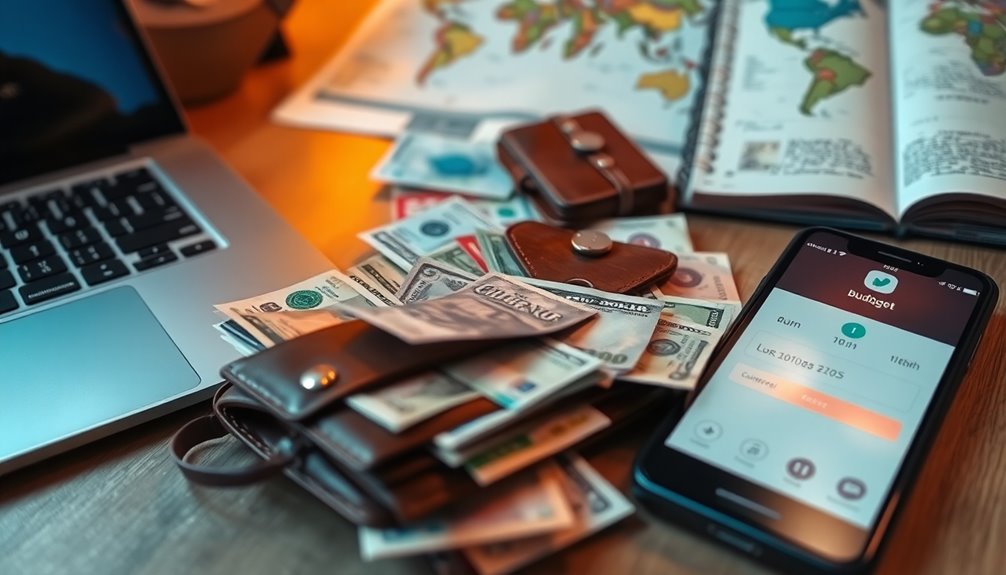
Keeping track of multiple currencies and expenses can seem intimidating, but staying organized is vital for managing your finances effectively. Start with simple budget tracking methods, such as using a dedicated app or spreadsheet to record all transactions. This helps you monitor your spending in different currencies and avoid overspending. Expense categorization is also essential; break down your costs into categories like food, transportation, and accommodation. This way, you can identify areas where you’re overspending and adjust accordingly. Regularly updating your records ensures accuracy and prevents financial surprises. By maintaining clear records, you gain better insight into your spending habits, making it easier to stay within your budget and manage your money across various currencies seamlessly.
Tips for Withdrawing Money at ATMs Abroad
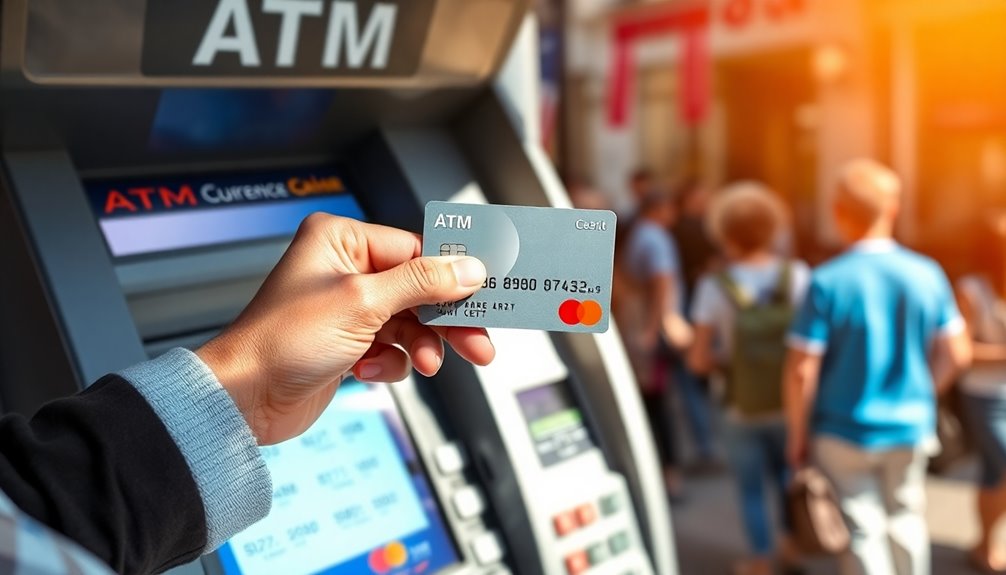
To avoid unexpected fees and inconvenience, it’s important to plan your ATM withdrawals carefully while abroad. First, check your bank’s ATM withdrawal limits to avoid declined transactions. Second, always be aware of local banking hours, as ATMs may be inaccessible outside these times. Third, carry a small amount of local currency in cash for emergencies or times when ATMs are unavailable. Fourth, choose ATMs in secure locations like bank branches or busy areas to prevent theft. Using ATMs with compatible networks can also reduce foreign transaction fees. Remember, withdrawing larger sums at once can minimize fees but stay within your ATM limits. Planning ahead guarantees smooth access to funds and helps you avoid unnecessary charges.
Best Practices for Currency Exchange at Airports and Hotels
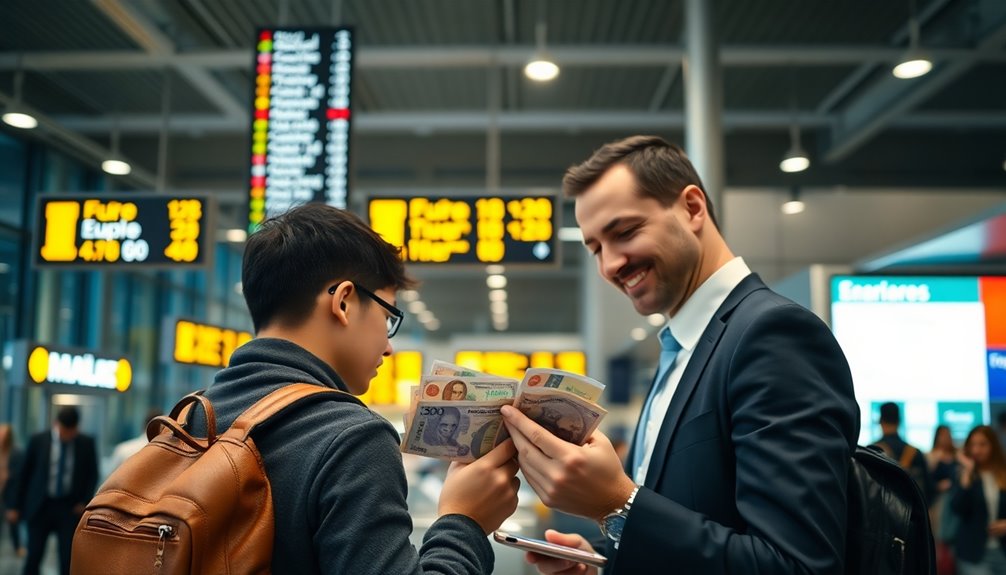
When exchanging currency at airports and hotels, it’s important to be strategic to avoid unfavorable rates and hidden fees. Airport exchanges and hotel currency services often charge higher fees, so compare options first. To maximize value, consider exchanging only small amounts at these locations and using local banks or ATMs for larger sums. Be aware that rates at airports tend to be less favorable, so plan accordingly.
| Location | Fees | Rates |
|---|---|---|
| Airport exchanges | Higher fees | Less favorable |
| Hotel currency services | Moderate fees | Slightly better |
| Local banks | Lower fees | Better rates |
| ATMs | Low fees | Competitive rates |
How to Handle Fluctuating Exchange Rates

Since exchange rates can fluctuate unpredictably, it’s essential to stay informed and adapt your currency strategy accordingly. To manage this effectively, consider these tips:
- Monitor exchange rate forecasts regularly to anticipate potential shifts.
- Use currency hedging options, like forward contracts, to lock in rates and reduce risk.
- Avoid converting large sums during volatile periods; spread out your transactions over time.
- Stay flexible and be ready to adjust your spending plans if rates move unfavorably.
Planning Your Currency Strategy Before Traveling
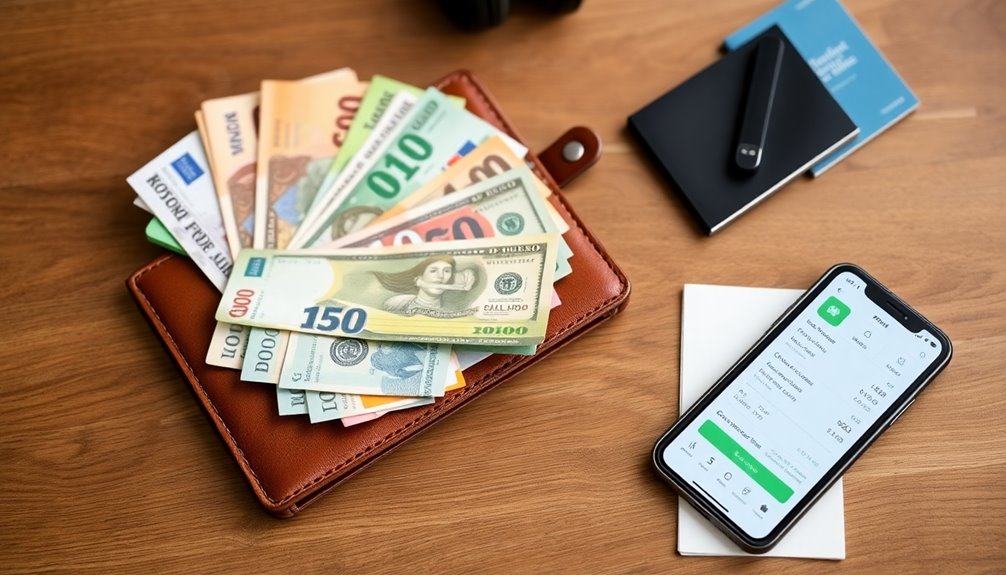
Before you travel, research your destination’s local currency options to find the most convenient and cost-effective methods. Set a clear budget and establish exchange limits to avoid overspending or losing track of your finances. Planning ahead helps you manage your money confidently and reduces surprises along the way.
Research Local Currency Options
Researching local currency options is an essential step in planning your currency strategy before traveling. Understanding local currency regulations helps you avoid surprises at checkpoints or exchanges, while exploring currency denomination options ensures you carry the right mix of bills and coins. To start, consider these key points:
- Check if there are restrictions on bringing in or taking out certain amounts of currency.
- Find out which forms of payment are widely accepted—cash, cards, or digital wallets.
- Research available currency denomination options to optimize your cash carrying and minimize exchange fees.
- Investigate local banking facilities or ATMs for convenient currency withdrawals.
Doing this prep work allows you to navigate local currency regulations smoothly and choose the best currency options for your trip.
Set Budget and Exchange Limits
Setting a clear budget and establishing exchange limits are crucial steps to guarantee you manage your funds effectively during your trip. By defining how much you plan to spend in each currency, you avoid overspending and reduce the risk of currency fluctuations hurting your finances. Establishing exchange limits helps prevent impulsive conversions at unfavorable rates. Use the table below to set realistic budgets and limits for each currency:
| Currency | Budget | Exchange Limit |
|---|---|---|
| USD | $2000 | $500 |
| EUR | €1500 | €400 |
| JPY | ¥250,000 | ¥50,000 |
| GBP | £1000 | £300 |
| AUD | $3000 | $600 |
This approach ensures you stay within your financial boundaries and maximize your money’s value during your travels.
Frequently Asked Questions
How Can I Prevent My Foreign Currency From Devaluing Quickly?
To prevent your foreign currency from devaluing quickly, stay informed about exchange rate predictions and consider currency hedging options. By monitoring market trends, you can time your conversions better. Currency hedging allows you to lock in rates and reduce risk. Also, diversify your currency holdings to minimize exposure. Regularly reviewing economic indicators and geopolitical events helps you anticipate shifts, protecting your assets from sudden devaluations.
What Are the Best Ways to Store Multiple Currencies Securely?
To store multiple currencies securely, you should use digital wallets that offer encryption and multi-factor authentication. Keep your digital wallet credentials private, update passwords regularly, and enable biometric security where possible. Avoid storing large amounts of cash, and consider using secure, reputable apps to manage your currencies. Follow security tips like avoiding public Wi-Fi when accessing financial info, and always back up your wallet data to prevent loss.
How Do I Handle Currency Exchange During Emergencies Abroad?
Imagine steering a stormy sea, where emergency cash acts as your lighthouse. During emergencies abroad, keep a currency backup in a secure, hidden spot, like a secret treasure chest. Use ATMs with your bank’s international network to access funds or exchange cash at trusted locations. Always carry small amounts of local currency, and consider a prepaid travel card for quick access, ensuring you’re prepared when unexpected waves hit.
Are There Specific Currencies More Favored for International Transactions?
You might wonder if certain currencies are better for international transactions. Popular currencies like the US dollar, euro, and Japanese yen are often favored because of stable exchange rate trends and global acceptance. Using these currencies can streamline transactions and reduce conversion costs. Keep an eye on exchange rate trends, as they fluctuate, affecting the value of your money. Choosing widely accepted currencies helps ensure smoother international dealings.
How Can I Budget Effectively With Fluctuating Exchange Rates?
To budget effectively amid fluctuating exchange rates, you should prioritize budget planning, set aside a buffer for currency swings, and stay informed with exchange rate forecasting. Track your expenses regularly, compare rates before transactions, and consider using multi-currency accounts or forward contracts for stability. By staying proactive, adjusting your budget as needed, and monitoring trends, you keep your finances secure despite currency fluctuations.
Conclusion
So, after all this planning, you might think handling multiple currencies is a breeze. Ironically, the more you prepare, the more unpredictable things become—exchange rates fluctuate, fees sneak in, and digital tools sometimes fail. But hey, isn’t that part of the adventure? Embrace the chaos, stay adaptable, and remember: in the world of international travel, the only constant is unpredictability. Happy travels—may your money survive the trip!









